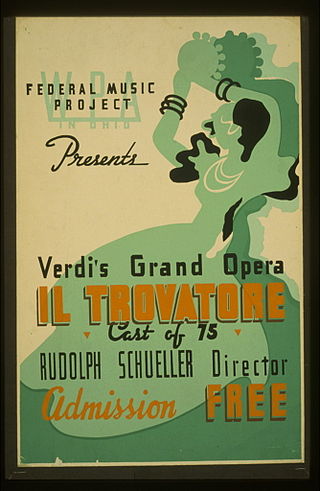
This is a list of notable events in music that took place in the year 1937.

This is a list of notable events in music that took place in the year 1933.
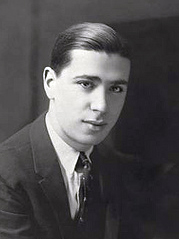
Sam Coslow was an American songwriter, singer, film producer, publisher and market analyst. Coslow was born in New York City. He began writing songs as a teenager. He contributed songs to Broadway revues, formed the music publishing company Spier and Coslow with Larry Spier and made a number of recordings as a performer.

Monkey Business is a 1931 American pre-Code comedy film. It is the third of the Marx Brothers' released movies, and the first with an original screenplay rather than an adaptation of one of their Broadway shows. The film also features Thelma Todd, Harry Woods and Ruth Hall. It is directed by Norman Z. McLeod with screenplay by S. J. Perelman and Will B. Johnstone. Much of the story takes place on an ocean liner crossing the Atlantic Ocean.
"Cocktails for Two" is a song from the Big Band era, written by Arthur Johnston and Sam Coslow. The song debuted in the movie Murder at the Vanities (1934), where it was introduced by the Danish singer and actor Carl Brisson. Duke Ellington's version of the song was recorded in 1934 and was inducted into the Grammy Hall of Fame in 2007.

"Shine On, Harvest Moon" is a popular early-1900s song credited to the married vaudeville team Nora Bayes and Jack Norworth. It was one of a series of moon-related Tin Pan Alley songs of the era. The song was debuted by Bayes and Norworth in the Ziegfeld Follies of 1908 to great acclaim. It became a pop standard, and continues to be performed and recorded in the 21st century.

Murder at the Vanities is a 1934 American pre-Code musical film with music by Victor Young. It was released by Paramount Pictures and directed by Mitchell Leisen. The film stars Victor McLaglen, Carl Brisson, Jack Oakie, Kitty Carlisle, Gertrude Michael, Toby Wing and Jessie Ralph. Future stars Lucille Ball and Ann Sheridan have small roles as chorines.
Arthur James Johnston was an American composer, conductor, pianist and arranger.
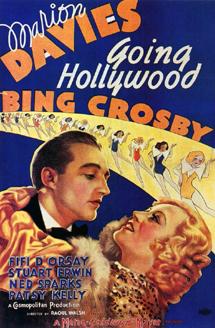
Going Hollywood is a 1933 American pre-Code musical film directed by Raoul Walsh and starring Marion Davies and Bing Crosby. It was written by Donald Ogden Stewart and based on a story by Frances Marion. Going Hollywood was released by Metro-Goldwyn-Mayer on December 22, 1933.
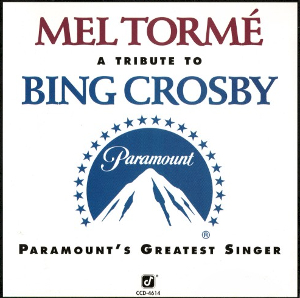
A Tribute to Bing Crosby is a 1994 studio album by Mel Tormé, recorded as a tribute to the singer Bing Crosby.

Bing: A Musical Autobiography was Bing Crosby's fourth Decca vinyl LP, recorded and released in 1954.

Sing You Sinners is a 1938 American musical comedy film directed by Wesley Ruggles and starring Bing Crosby, Fred MacMurray, Ellen Drew, and Donald O'Connor. Written by Claude Binyon, the film is about three singing brothers who go to California to find their fortune. Initially the film was to be titled "The Unholy Beebes" and then "Harmony for Three" before finishing with "Sing You Sinners". Filming took place in April/May 1938 in Hollywood. Race track scenes were filmed at the Pomona Fairgrounds and at Santa Anita using two dozen of Crosby's horses. Sing You Sinners was premiered on August 5, 1938 at the Del Mar racetrack with the New York premiere taking place on August 16.

College Humor is a 1933 American pre-Code musical comedy film, directed by Wesley Ruggles, and starring Bing Crosby, Jack Oakie, Richard Arlen, Mary Kornman and Mary Carlisle. Based on a story by Dean Fales, the film is about a college professor and the school's star football player who become rivals for the same beautiful student. Released by Paramount Pictures, the film co-stars George Burns and Gracie Allen.

Star Spangled Rhythm is a 1942 American all-star cast musical film made by Paramount Pictures during World War II as a morale booster. Many of the Hollywood studios produced such films during the war, with the intent of entertaining the troops overseas and civilians back home and to encourage fundraising – as well as to show the studios' patriotism. This film was also the first released by Paramount to be shown for 8 weeks.
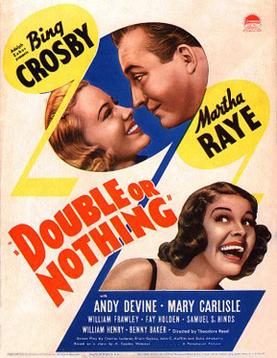
Double or Nothing is a 1937 American musical comedy film directed by Theodore Reed and starring Bing Crosby, Martha Raye, Andy Devine, Mary Carlisle and William Frawley. Based on a story by M. Coates Webster, the film is about a dying millionaire who instructs his lawyer to drop twenty-five purses on the streets of New York City, which are found and returned by four honest people. According to the will, each of them is given five thousand dollars, which they must double within thirty days in order to claim one million dollars. Greedy relatives, who were cut from the will, try to thwart each one's plans. The film features the popular song "The Moon Got in My Eyes".

Rosie Sings Bing is a 1978 studio album by the American jazz singer Rosemary Clooney, recorded in tribute to Bing Crosby, who had died the previous year. The album was the second Clooney made for Concord Records.
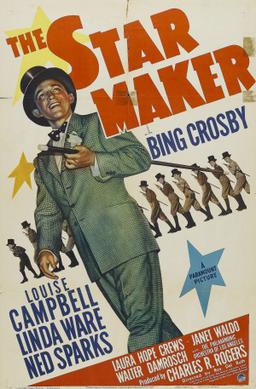
The Star Maker is a 1939 American musical film directed by Roy Del Ruth, written by Frank Butler, Don Hartman and Arthur Caesar, and starring Bing Crosby, Louise Campbell, Linda Ware, Ned Sparks, Laura Hope Crews, Janet Waldo and Walter Damrosch. Filming started in Hollywood on April 17, 1939 and was finished in June. The film was released on August 25, 1939, by Paramount Pictures, and had its New York premiere on August 30, 1939. It was the only film in which Crosby played a happily married man.

Out of This World is a 1945 American romantic comedy film directed by Hal Walker and starring Eddie Bracken, Veronica Lake and Diana Lynn. The picture was a satire on the Frank Sinatra "bobby soxer" cult.
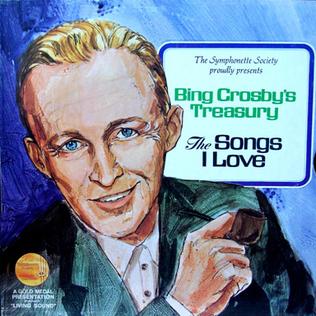
Bing Crosby's Treasury - The Songs I Love is an LP set by Bing Crosby, issued in both mono and stereo formats by a mail-order firm, The Longines Symphonette Society, which was an educational service from the Longines-Wittnauer Watch Company. A similar LP set had been issued in 1966, and this updated version had a total of thirty-six Crosby vocals.

















